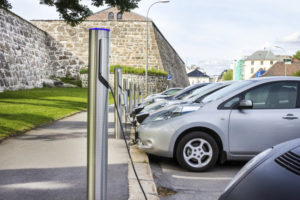The Irish government recently issued a Climate Action Plan and in the title of its response to that Plan, the Stop Climate Chaos Coalition (“Coalition”) and Environmental Pillar (“Pillar”) ask, “Will it lead to a revolution in how we live?” The simple answer is, No. A more complicated answer is, Probably not.
The history behind the Plan is clear, and unimpressive. Ireland has never had an economy-wide climate or de-carbonisation policy that lays out concrete steps for meeting its climate obligations under EU law. It is on course to fail to meet those obligations for 2020 or 2030, without extensive purchasing of carbon off-sets. Ireland is also the worst country in Europe, and 48th out of 60 countries globally, on climate change performance, as measured by the 2018 Climate Change Performance Index.

The government’s recent Plan is in large part a response to the Citizens’ Assembly and Oriechatas Joint Committee on Climate Change reports, both of which have produced ambitious climate targets. The Plan also has to be read in light of the Intergovernmental Panel on Climate Change (IPCC) report in October 2018, which estimated that we have just 12 years to limit devastating global warming.
Perhaps the most hopeful sign from the government has been its recent admission that it is a climate laggard. And a positive note about the Plan is that it adopts a number of the Joint Committee’s proactive governance structures for dealing with climate breakdown. Specifically the Plan calls for 5-year carbon budgets in a new Climate Action Bill; a Climate Action Delivery Board for holding public agencies and bodies accountable for climate targets, with quarterly progress review; a strengthened Climate Action Council; and a standing legislative Committee to monitor compliance with climate actions.
Much of the rest of the Plan is flat-footed.
As the Coalition and Pillar assessment indicates, the actual policy detail of the government’s Plan for forestry and land use “is vague and mostly aspirational.” For instance, the Climate Action Plan proposes to plant 440 million trees in Ireland by 2040. That is 22 million trees every year from now to 2040. Yet Ireland historically has one of the lowest forest covers of any EU country, and the Plan admits that there is a lack of enthusiasm among the farming community for forestry. So how the Plan will accomplish its goal for planting 440 million trees remains a mystery.

Similarly for transport, the government’s Plan proposes to have up to an average of 100,000 electric vehicles (EVs) annually over the next decade. That’s one million EVs by 2030. The latest figures show that there were 4825 electric cars in Ireland on the road at the start of 2019, out of a total of 2.7 million vehicles. The road to an eCar future is unpaved, and the alternatives for public transport are unexplored by the government.

The Plan also proposes to have 500,000 homes undergo deep retrofit by 2030. Yet currently there are about 23,000 shallow retrofits annually so the plan would require more than doubling just shallow retrofits, with substantially more effort and resources to convert to deep retrofits.
It also has to be noted that these are all proposals, not promises, from the government. While the Climate Change Advisory Council does not address the government’s Plan in detail, it does offer an overall critical evaluation: “The continued failure to set out detailed pathways on the cost-effective route to decarbonising the Irish economy by 2050 is a major obstacle to progressing policy on climate change… While Ireland can comply with its EU targets by purchasing emissions allowances, this use of public funds – with no domestic benefit – would impose a current cost on the Exchequer and would leave Ireland with a bigger and more expensive task to meet its future targets to 2030 and beyond.” At iv.

At the recent United Nations General Assembly meetings, the Taoiseach Leo Varadkar announced that Ireland, as part of its climate plan, would ban any future drilling for oil off the coast of Ireland. While encouraging as a step to moving away from reliance on fossil fuel, it turns out to be a half step, with a limp. As Richard Curran points out, despite exploration for oil off the Irish coast for over 20 years, no oil has been found. In effect, “[T]he government is saying it won’t let anybody find nothing any more.” Curran. Moreover, the “ban” does not apply to existing licences and Ireland issued new licenses of oil and gas exploration within weeks of recently declaring a climate emergency. O’Doherty. The “ban” does not yet cover gas, and the government is supporting a major liquid natural gas terminal in Kerry to import gas from American fracking operations even as Ireland banned fracking in Ireland.
So one does have to ask: Are the targets outlined in the Climate Action Plan impressively ambitious or just a fantasy to divert criticism? A clue is in the language used to describe what the government is ultimately asking of its citizens and businesses in this Plan. As the report by the Coalition and Pillar reveals: “When published in mid-June 2019, the Climate Action Plan was described by the Minister and the Taoiseach as “ambitious but realistic”, “sensible and fair”, “most economic”, that it will “nudge people to change behaviour”, “create the least burden on our people”, and “deliver the revolution in how we live”. “
The language reflects a go-slowly approach, a let’s-not-rush-or-burden anyone. Unfortunately, the climate is rushing along at a very dangerous pace, it will not await laggards, and it will produce its own devastating burdens.
Sources:
Department of Communications, Climate Action and Environment, Climate Action Plan 2019 bit.ly/2WNYimT
The new Climate Action Plan: Will it lead to a revolution in how we live? Report from the Stop Climate Chaos Coalition and the Environmental Pillar on their analysis of the Climate Action Plan (July 2019). bit.ly/2m5fhV5
“Ireland is Still Lagging on Climate Change,” in the Reports section of irish environment magazine (1 April 2019) bit.ly/2wqAA5a
Brain Hutton, “Climate change: Ireland plans to plant 440m trees by 2040,” The Irish Times (31 August 2019). bit.ly/2kpUVFk
“Electric Cars in Ireland – Some Facts and Figures,” Money Guide Ireland (12 June 2019). bit.ly/2mtAZlP
Climate Change Advisory Council Annual Review 2019 (July 2019). bit.ly/2kPfMSS
Richard Curran: “Leo’s oil ban looks more like energy PR than energy policy,” Irish Independent (26 Sept 2019). bit.ly/2nc6Gk3
Caroline O’Doherty, “Pretenders? The truth about Ireland’s grand plan to go green,” Irish Independent (21 Sept 2019). bit.ly/2mrRI8W


No comments yet, add your own below